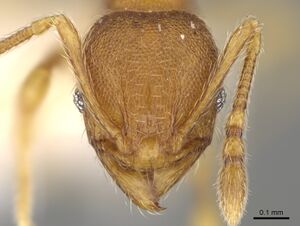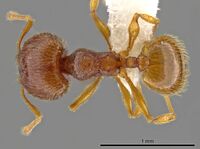Pheidole perissothrix
| Pheidole perissothrix | |
|---|---|

| |
| Scientific classification | |
| Kingdom: | Animalia |
| Phylum: | Arthropoda |
| Class: | Insecta |
| Order: | Hymenoptera |
| Family: | Formicidae |
| Subfamily: | Myrmicinae |
| Tribe: | Attini |
| Genus: | Pheidole |
| Species: | P. perissothrix |
| Binomial name | |
| Pheidole perissothrix Longino, 2019 | |
This species occurs in lowland wet to dry forest, typically in second growth areas. It is known mostly from Winkler samples of sifted litter and rotten wood. It occurs rarely at ground baits. Two collections from northwestern Costa Rica are a worker from a pitfall trip and a dealate queen from a Malaise trap.
Identification
Minor: face uniformly foveolate; promesonotal groove absent; entire mesosoma foveolate; propodeal spines about one third length of posterior face of propodeum; gaster smooth and shining; setae on face and dorsal mesosoma short, curved; setae on gastral dorsum short, decumbent, often minutely branched (typically trifid); tibiae without erect setae; color orange yellow.
Major: inner hypostomal teeth distinct, closely spaced; scape base terete; face with shallow antennal scrobes, dorsal margin delimited by extension of frontal carinae, ventral margin indistinct; face with subparallel, well-spaced, longitudinal carinae extending to vertex margin, interspaces smooth and shiny or with faint microsculpture; propodeal spines about one quarter length of posterior face of propodeum; gastral dorsum smooth and shining; pilosity on sides of head short, decumbent, other pilosity similar to minor worker.
Measurements, minor worker: HW 0.43, HL 0.47, SL 0.41, EL 0.08, WL 0.46, PSL 0.04, PTW 0.09, PPW 0.11, CI 91, SI 97, PSLI 9, PPI 128 (n=2).
Measurements, major worker: HW 0.72, HL 0.74, SL 0.43, EL 0.11, WL 0.60, PSL 0.05, PTW 0.13, PPW 0.21, CI 97, SI 60, PSLI 6, PPI 154 (n=2).
Pheidole perissothrix in habitus is very similar to Pheidole glomericeps and Pheidole flavens, and it could easily be misidentified as these more common species. It differs in the distinctive short, curved, and often branched pilosity. Other "flavens" type species (Pheidole exigua, Pheidole flavens, Pheidole glomericeps, Pheidole moerens, Pheidole navigans) have typical pilosity, which is longer, less curved, and suberect. COI barcoding on BOLD clusters two specimens from northwestern Costa Rica with a specimen from the Caribbean coast of Honduras. The image of a headless worker on BOLD matches the morphological features described above. The COI cluster is isolated in Pheidole and is not near P. flavens or P. glomericeps.
Distribution
Guatemala to Costa Rica.
Latitudinal Distribution Pattern
Latitudinal Range: 15.51133° to 15.41274°.
| North Temperate |
North Subtropical |
Tropical | South Subtropical |
South Temperate |
- Source: AntMaps
Distribution based on Regional Taxon Lists
Neotropical Region: Costa Rica, Guatemala (type locality), Honduras, Nicaragua.
Distribution based on AntMaps
Distribution based on AntWeb specimens
Check data from AntWeb
Countries Occupied
| Number of countries occupied by this species based on AntWiki Regional Taxon Lists. In general, fewer countries occupied indicates a narrower range, while more countries indicates a more widespread species. |

|
Estimated Abundance
| Relative abundance based on number of AntMaps records per species (this species within the purple bar). Fewer records (to the left) indicates a less abundant/encountered species while more records (to the right) indicates more abundant/encountered species. |

|
Biology
Castes
Worker
Minor
Images from AntWeb
   
| |
| Paratype Minor. Specimen code CASENT0611576. Photographer Michele Esposito. | |
Nomenclature
The following information is derived from Barry Bolton's Online Catalogue of the Ants of the World.
- perissothrix. Pheidole perissothrix Longino, 2019: 53, fig. 9 (w.) GUATEMALA.
Type Material
- HOLOTYPE: 1 major worker, Guatemala, Izabal: 16km ESE Morales, 15.41764 -88.69683 ±70 m, 410 m, 19-May-2009, 2º lowland rainforest, ex sifted leaf litter (LLAMA, Wm-B-04-2-09) [MCZC, unique specimen identifier CASENT0611573].
- PARATYPES: major, minor workers: same data as holotype [CAS, MCZC]; same data except 15.41274 -88.71023 ±27 m, 415 m (Wm-B-04-2-05) [DZUP, USNM]; 5km NW Morales, 15.51133 -88.86185 ±35 m, 195 m, 18-May-2009, 2º lowland rainforest, ex sifted leaf litter (LLAMA, Wm-B-04-1-04) [JTLC, UVGC].
Description
Etymology
In reference to the unusual setae.
References
References based on Global Ant Biodiversity Informatics
- Longino J. T. 2019. Pheidole (Hymenoptera, Formicidae) of Middle American wet forest. Zootaxa 4599: 1-126

